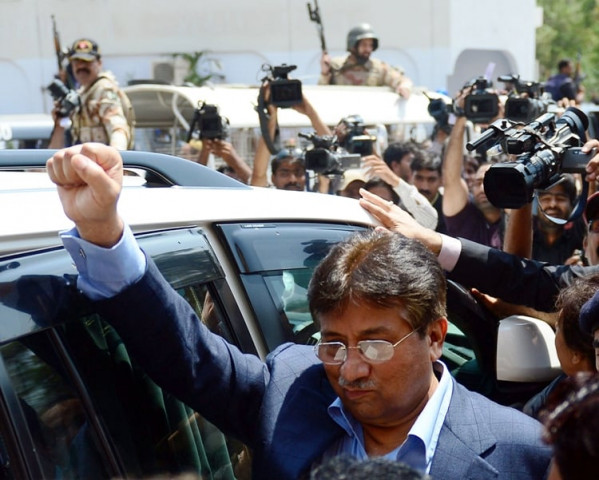High treason charge: Supreme Court takes up petition against Musharraf today
Chief justice steps down from the bench.

The petitioner requested the court to direct the federal government to prosecute Musharraf under the High Treason Act 1973 for suspending the Constitution and imposing emergency rule in 2007. PHOTO: AFP
On Friday, the Supreme Court formed a three-member bench, headed by Justice Chaudhry, to hear the petition against Musharraf who is also facing a barrage of legal cases, including the 2006 killing of Baloch chieftain Nawab Akbar Bugti and the 2007 assassination of former premier Benazir Bhutto.
Now, a two-member bench – comprising Justice Jawwad S Khawja and Justice Khilji Arif Hussain – will hear the petition filed by Advocate Taufiq Asif, the president of Rawalpindi chapter of the Lahore High Court Bar Association.
The petitioner requested the court to direct the federal government to prosecute Musharraf under the High Treason Act 1973 for suspending the Constitution and imposing emergency rule in 2007 – a move that had finally led to his downfall.
Nominating Musharraf and the federal government as respondents, the petitioner further said that “the federal government may be directed to take Pervez Musharraf into custody immediately awaiting his investigation and prosecution under the High Treason Act.”
The bench will also hear two other petitions filed by Maulvi Iqbal Haider and Barrister Amjad Malik. The first petition challenges the actions taken by Musharraf on November 3, 2007, while the second questions his candidature to run for elections.
Pervez Musharraf, who now leads his own political party – the All Pakistan Muslim League – returned to Pakistan on March 24 from four years in self-imposed exile to lead his party in the May 11 elections. He was upbeat about winning popular support – but his powerbase has shriveled since he left the country four years ago.
On October 12, 1999, then army chief Gen Pervez Musharraf had toppled the constitutionally elected government of Nawaz Sharif in a bloodless coup and imposed military rule. Later in 2007, he had declared emergency rule and sacked dozens of superior court judges, putting many of them, including Justice Chaudhry, under house arrest.
Experts believe as a head of the state, Musharraf was constitutionally empowered to impose emergency rule. “The president has the authority to impose emergency rule – but Musharraf could be tried for treason if the court declares his November 3, 2007 steps unconstitutional,” Advocate Ali Zafar told The Express Tribune.
However, he added that “misuse of authority [by the president] cannot be tantamount to high treason.” Citing the dismissal of Nawaz Shairf’s first government by then president Ghulam Ishaq Khan, Advocate Zafar said, “The court had held that the exercise of power by the president was erroneous.” He added that Musharraf could stand trial for treason if the court declares that he did not have the power to take such steps.
Under the High Treason Act 1973, only an official of the federal government can register the case. Advocate Zafar said the court might direct the federal government to file a high treason case against Musharraf. But the former general would have the right to defence, if the proceedings are initiated.
But Justice (retd) Tariq Mehmood says the Supreme Court has already declared the steps taken by Musharraf unconstitutional in its judgment of July 30, 2009 in the Sindh High Court Bar Association case. “The court has also declared him [Musharraf] usurper,” he added.
Justice Mehmood said Musharraf’s defence would depend on the nature of case [if filed by the federal government] and that he could name others in the case. “Musharraf can say that he had taken the steps on the advice of the then prime minister and others,” he added. “In such a scenario, the trial could linger on.”
Article 6 of the Constitution that deals with high treason says, “Any person who abrogates or subverts or suspends or holds in abeyance, or attempts or conspires to abrogate or subvert or suspend or hold in abeyance, the Constitution by use of force or show of force or by any other unconstitutional means shall be guilty of high treason.”
Published in The Express Tribune, April 8th, 2013.



















COMMENTS
Comments are moderated and generally will be posted if they are on-topic and not abusive.
For more information, please see our Comments FAQ